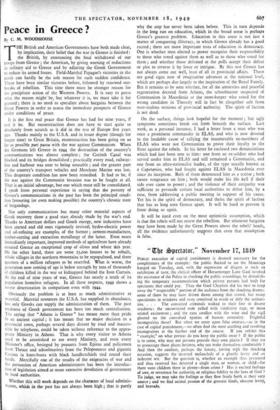" Vie *spectator," November 17, 1849 PuaLic execution of capital
punishment is deemed necessary for the completeness of the example: the public flocked to see the Mannings hanged on Tuesday, and, with the expression of disgust at such an exhibition of taste, the clerical officer of Horsemonger Lane Gaol invoked the assistance of the Police in checking the public assemblage, by demolish- ing the temporary accommodation which private persons had built for spectators that could pay. Thus the Gaol Chaplain did his best to keep away the " respectable " portion of the audience from the shocking drama: some of them he may have driven down among that crowd, but many speculators in windows and seats contrived to evade or defy the authori-
ties. . . . The convicted criminals walked to their fate in decent staidness: the unconvicted mob yelled with vindictive rage, or mere animal excitement ; and the eyes swollen with the wine and the vigil gloated on the convulsed agonies of human extremity. Frightful incongruities these! But when we enter upon false courses,—as in the case of capital punishment,—we often find the most startling and revolting
incongruities at the further end of the course. If you exhibit this " example," on what pretext do you keep the public away ? If the public is to come, why may not persons provide their own places ? If they are to preoccupy those places betimes, why not make themselves comfortable ? And then the comfort, perhaps the luxury, jarring with the shocking occasion, suggests the inverted melancholy of a ghastly levity and an indecent wit. But the question is, whether an example thus presented and thus received has deterred a single man, or woman, or child—for there were children there in plenty—from crime ? Has it excited feelings of awe, or reverence for authority, or religious fidelity to the laws of God ? To judge, we may take the feelings as they flow freely forth at their very source ; and we find animal passion of the grossest kinds, obscene levity, and bravado.














































































 Previous page
Previous page